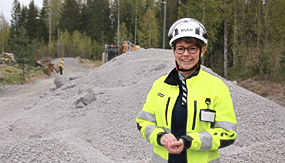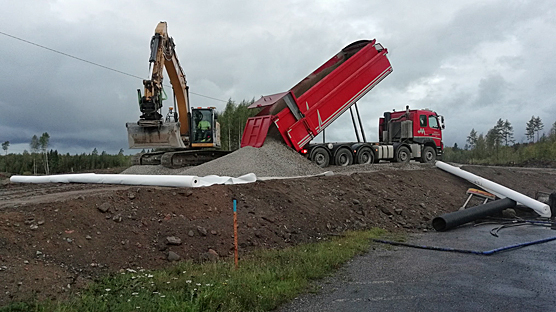
Jenni Nurmi © Timo Makkonen
A Circwaste sub-project by Prizztech and the City of Pori investigated the properties of Ecolan Infra®TR ash granules. The recovered materials were used in the Söörmarkku interchange project by the Finnish Transport Infrastructure Agency in Pori for a whole year.
“The ash granule was used in a 100-metre detour for the construction period,” explains Jenni Nurmi from Reroute Ltd, who was Ecolan’s expert on circular economy through the project. The carrying capacity of the construction was measured during the year. The results of the qualities of the recovered material that is made from fly and base ash are collected in a report that is publicly available.
Recovered material outlasted better-known alternatives
Under the supervision of the Finnish Transport Infrastructure Agency, the project sought to find out how well ash granules work in replacing natural materials in infrastructure construction projects. The stretch of road with recovered materials in its blanket course was more durable than the stretches completed with more well-known materials.
“The asphalt remained intact for the length of the entire detour in the stretch constructed with recovered materials,” Niemi describes. In other stretches of road, asphalt had to be patched during the year. According to the results, it is possible to influence the long-term durability of the structures. “It is crucial for the environment that infrastructure has a long life cycle. Virgin materials are often needed for repairs.”
No extra work for construction workers
Nurmi says that it is vital to get the builders’ approval to apply recovered materials in groundworks and infrastructure projects in a wider degree. The projects often have very tight schedules, so using recovered materials cannot mean extra work.
“Infra builders are, by nature, a critical audience, so this was a great success as we received feedback that the ash granules worked well and proved a great construction base!”
People in the field are hoping to have more of these major projects instead of small pilot projects. “Taking the next step takes courage, but as experts we can help to evaluate when enough primary data has been achieved for scaling the projects,” Nurmi encourages others.
This project is an important trailblazer in the use of recovered materials to build real roads, not just test road stretches of five or ten metres. “Such experiences can offer the whole infrastructure industry and local businesses important information regarding the practical application of recovered materials.”

© Jenni Nurmi
Material approval by Finnish Transport Infrastructure Agency to recovered materials
Other pioneering efforts took place on the way. Together with the Finnish Transport Infrastructure Agency, the project contributed to a new material approval process that can benefit all who process recycled materials.
“We got the first project-specific approval for the ash granules and managed to develop a process that the Finnish Transport Infrastructure Agency can utilise with other recovered materials as well,” Nurmi states.
The recovered materials found permanent use nearby
The research of the properties of the ash granules will continue in the next location they are used, the Hämeenkyröväylä road.
“It is often a challenge to find further uses for recovered materials after the test period, but the project in Pori made history in this respect, too” Nurmi says, delighted. The ash granules used in the detour for a year were taken into permanent use in a nearby pedestrian and cycling lane. “It does not happen often that you find a new purpose of use for a recycled material so close. I hope we will find same kind of test cases for other materials and in other sites.”
Read more